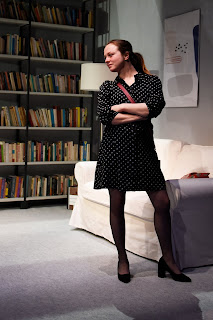John, who's just been granted tenure, is trying to get away so he can finalise the paperwork on the new house he's buying with his raise. As a tearful Carol asks about her failing grade in his course, he ignores the calls from his wife and estate agent chasing him, to try and help her understand the concepts she didn't grasp in his classes.
This opening scene takes up about half the play, with the rest dissecting what happened in this meeting and dealing with the aftermath. John, who's made a career in Higher Education but whose book somewhat dismissively questions its very relevance, is happy to put in the extra time with a student who's strongly implied to come from a less privileged background, and in whom he says he sees similarities with his younger self. His lecture is patronising, sexist, at times overfamiliar, deeply self-satisfied with his idea of himself as the educator who can enlighten a promising student, and no doubt motivated in part by having a young woman hang on his every word, but it does at heart seem to come from a place of wanting to teach. So does it amount to sexual harassment, as Carol publicly accuses him in the following two scenes?
Mamet is here to ask questions and offer no answers, in a two-hander play neither of whose characters are at all easy to like. John is certainly guilty of sexist behaviour in general terms, and is happy to use his straight white male privilege. But they're not equally unlikeable, with Carol increasingly revealing herself as monstrous and manipulative*. Where the play feels problematic to me is that women still have trouble being believed about sexual assault and harassment today, let alone when the play was written, and Oleanna gives us a confident and astute woman who goes into the office playing the crying rube, taking notes every time John says something that could conceivably be misconstrued, and then methodically doing exactly that to take down his life and career. Clearly there's not meant to be a definitive answer to the play, but for me while John is gradually revealed to be guilty in the abstract, the very specific things he's accused of are deliberately taken out of context and exaggerated; it might be aiming for balance but I felt uncomfortably as if the play was coming down on the side of the argument that these accusations are trumped-up and malicious.
On a more practical side my inner Annie Wilkes was slightly awoken by the fact that John's behaviour towards his female students is later revealed to be generally considered a bit suspect (if you go in for the interpretation that Carol stepped into the office with the intention of entrapping him, this would seem to be the motive.) Obviously you need twists and revelations in drama, but in one like this that revolves around two people's differing accounts of a meeting that the audience have seen in its entirety, throwing in additional background information late in the day feels like a cheat. There's also quite a hefty amount of suspension of disbelief required for the last two scenes to even happen - not just for John to be naïve or arrogant enough to have two more meetings with Carol without witnesses after how the first one turned out, but for the University itself not to be on high alert not to let that happen.
Alex Eales' set is a suitably banal location for all of this to go down, its main feature the ceiling-high bookshelves that dominate the room, imposing John's intellect on everyone who comes in, so it's a suitable metaphor in a play essentially about power: How it's used and abused insidiously, and then the tables are turned and it's used much more aggressively. Oleanna is built to start conversation and still absolutely works on that front, and there's no question its motives are a lot more honest than Bitter Wheat's, but however subtly the roles are played Carol's ultimate goal is still revealed to be sweeping censorship of the curriculum (I can just see the kind of people who go on about Cancel Culture without knowing what it is feeling vindicated by the revelation) so it's hard to argue that Mamet doesn't heavily tip the scales‡.
Oleanna by David Mamet is booking until the 23rd of October at the Arts Theatre.
Running time: 1 hour 30 minutes straight through.
Photo credit: Nobby Clark.
*SPOILER ALERT: Much of the controversy around the original London production apparently came from the fact that the audience cheered when John finally hit her.
‡To follow up on my first footnote, so still SPOILERy, Mamet wrote a play that, at the Royal Court in 1993, made audiences cheer at a man hitting a woman. You could argue that the point was to make audiences do that, and then have to look back at their own reaction, but while Mamet is a revered writer and in many ways rightly so, is he that writer? I can only go by my own (comparatively limited) experience of his work but based on that I'm not convinced he is.





No comments:
Post a Comment